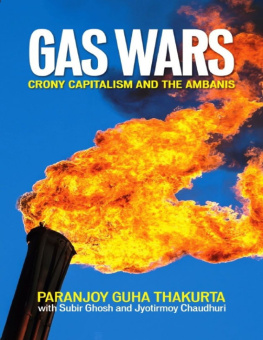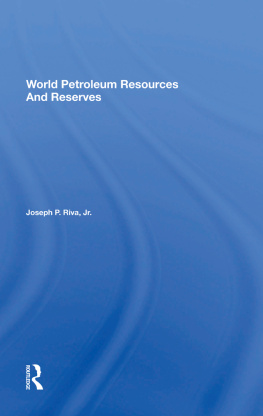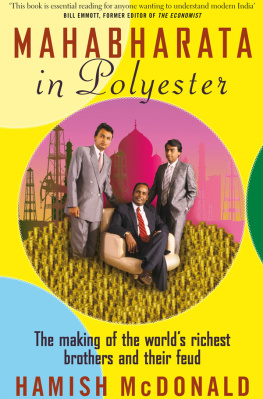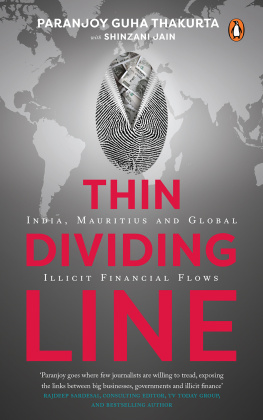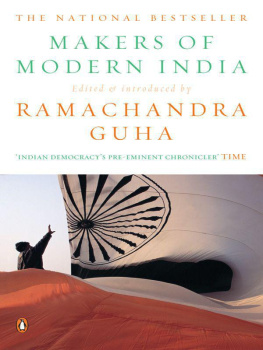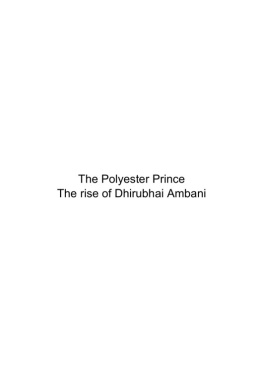
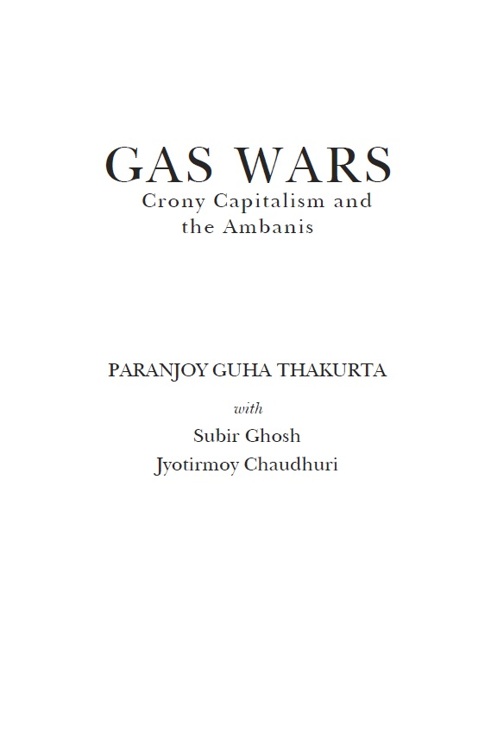
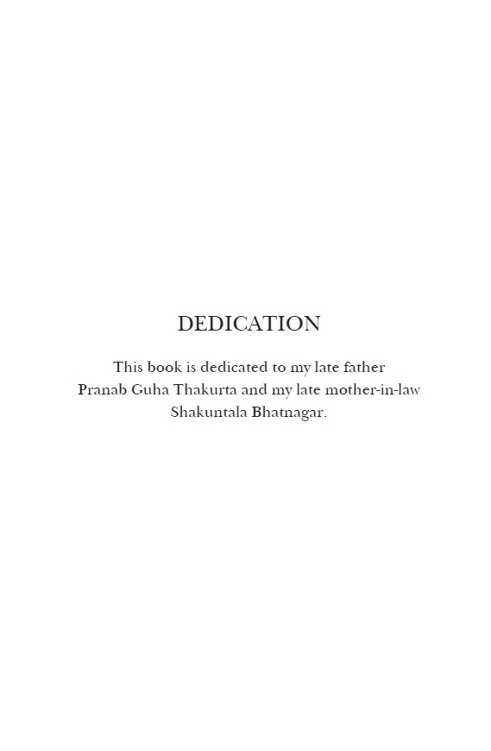
CONTENTS
I Ambani vs. Ambani
II Culpable Connivance, Damning Evidence?
III Collateral Damage
IV Nexus Between Big Business and Politics
PREFACE
Natural gas that lies below the ocean bed in the Bay of Bengal along the southeast shores of India off
the basin of two great rivers, the Krishna and the Godavari, has become the subject of considerable
controversy. Sections within the government of India, including the office of the Comptroller and
Auditor General (CAG) of India, a constitutional authority mandated to oversee public finances, have
been sharply critical of the manner in which another wing of the government, the ministry of
petroleum and natural gas (MoPNG), designed contracts and tailored rules to favour the countrys
largest privately owned corporate conglomerate, Reliance Industries Limited (RIL), headed by Indias
richest man Mukesh Ambani.
Prime minister Manmohan Singh has been accused of changing ministerial portfolios at the behest of
the same corporate group, an allegation that RIL predictably denies. There have been claims that the
group deliberately squatted on reserves of natural gas and curtailed production in anticipation of
higher prices that are administered by the government, to the detriment of the interests of the
countrys people. Spokespersons of the Reliance group, however, contend that gas output from the
Krishna-Godavari (KG) basin (in areas where it is contracted to operate) came down on account of
unforeseen adverse geological surprises. The CAG has alleged, among other things, that the contract
between the MoPNG and RIL was flawed, thereby encouraging excessive capital expenditure and
lowering potential benefits to the exchequer.
Over and above these claims and counter-claims, there is another unique dimension to the controversy
relating to extraction of natural gas from the KG basin by the Reliance group. The business empire
controlled by the Ambani family got divided on account of sibling rivalry between Mukesh Ambani
and his younger brother, Anil. While many reasons have been attributed to the split in the family, this
book argues that the battle between the Ambani brothers was largely about wresting control over
reserves of natural gas that are below the ocean bed along the basin of the two greatest rivers of
southern India.
In July 2002, Dhirubhai Ambani, founder of the Reliance group of companies and Indias biggest and
one of its best-known industrialists, died. For two years thereafter, his remained the archetypal
business family. The patriarch, a first-generation entrepreneur, had died intestate (or without leaving a
will). All seemed well until the older of Dhirubhais two sons, Mukesh, admitted in November 2004
that he was having differences with his younger brother, Anil, over ownership issues. The sibling
rivalry, earlier fought inside boardrooms, spilled out into the open. It became a pyrrhic family battle,
which sucked in many influential Indians, from politicians and corporate leaders to bureaucrats and
journalists. The tussles took place in the highest courts of the land, through public advertisements and
in hundreds of published articles, features on television and on websites. Almost everyone who was
someone in the country took sides in the Great Ambani War, so wide was the spread and influence of
the once undivided Reliance business empire.
The two brothers had fought over many issues, but what sometimes got lost in the din of the battle
cries was a simple fact: much of the tussle was over Indias natural resources, about how the resources
were intended to be mined, marketed and monetised.
In May 2010, the elder brother would go on to win a protracted legal dispute that lasted almost six
years. A crucial verdict by the Supreme Court of India went in favour of Mukesh Ambani allowing
companies under his stewardship to control access to natural gas. Subsequently, even as the siblings
claimed they had sorted out their differences, the waters of the KG basin got progressively murkier.
News would periodically trickle out, from sources close to Anil, from corporate rivals, from a few
conscientious bureaucrats and from a lone ranger Left-aligned Member of Parliament Tapan Sen who
was a member of the Parliamentary Standing Committee on Petroleum and Natural Gas. The
information pointed to rather questionable deals relating to KG gas and how RIL was fleecing the
country in connivance with particular government functionaries.
By 2010, the CAG had begun conducting an audit of hydrocarbon production-sharing contracts. Few
people take an interest in such audits while they are on. The reports are often written in dull
bureaucratic language and replete with technical information. In this instance, however, the draft
report of the CAG was leaked to the media. The report was, to say the least, damning. The deals were
dirtier than alleged. The CAGs office headed by former bureaucrat Vinod Rai took a firm stand
disapproving the production-sharing contract and laid the blame squarely on the government, that is,
the MoPNG, then headed by Murli Deora, a Congress politician from Mumbai. The CAG report,
tabled in Parliament in September 2011, did not quantify the losses to the state exchequer caused by
RIL, but its insinuations were clear: the company had reaped huge profits thanks to the acts of
commission and omission of a number of influential ministers and bureaucrats. The exchequer had
been cheated because the government had failed to act as an impartial custodian of resources that
belong to the people of India.
In October 2012, when Sudini Jaipal Reddy was removed from the post of Union minister of
petroleum and natural gas and made minister for science and technology, opposition politicians
alleged that he had been kicked upstairs because he had refused to kowtow to the Ambanis. His
ministry had claimed that RIL was deliberately reducing gas output and exerting pressure on the
government to increase the administered price of gas, charges the company denied. The ministry
alleged that the fall in gas production had resulted in an estimated loss of $6.3 billion (or over Rs
32,000 crore at that time) to the country and sought to levy a penalty on the company. In June 2013,
another Left MP Gurudas Dasgupta went hammer and tongs at Jaipal Reddys successor M. Veerappa
Moily for over-ruling his own ministrys bureaucrats as well as those of other ministries to prepare
the ground for a hike in the government administered price of gas, describing the episode as a gigantic
scam. Unfazed, later that month, a deeply divided Cabinet Committee on Economic Affairs decided to
double the price of gas with effect from April 2014. This raised a hue and cry amid allegations that the
government had gone out of its way to favour RIL.
This book is an attempt to unscramble and explain the entire series of controversies relating to KG gas
and the battle between the Ambani brothers. It highlights cases of crony capitalism that allowed the
RIL group to blatantly exploit loopholes that were consciously retained in the system. In doing so, it
Next page
